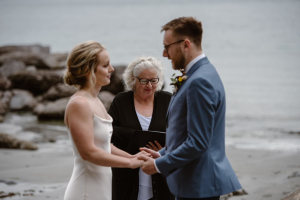Pastoral Self-Care for Wedding Officiants
by Rev. Cecilia Penner
This is an abridged version of a paper written by Rev Cecilia. She is available to speak with any clergy members who have comments or questions. Please reach out to the church to be connected with her.
 Officiating a wedding is a responsibility, an honour and a distinction. Guiding a couple through the legal and emotional aspects of entering the contract and covenant of marriage requires communication prowess, administrative skills, and an ability to engage, connect and command the attention of an assembly of attendants and guests. There are many resources on how to conduct a wedding ceremony. What is missing in those resources is how the officiant or celebrant should look after themselves in order to give their all. Pastoral self-care of the officiant is necessary in the time leading up to the ceremony and the time after its delivery.
Officiating a wedding is a responsibility, an honour and a distinction. Guiding a couple through the legal and emotional aspects of entering the contract and covenant of marriage requires communication prowess, administrative skills, and an ability to engage, connect and command the attention of an assembly of attendants and guests. There are many resources on how to conduct a wedding ceremony. What is missing in those resources is how the officiant or celebrant should look after themselves in order to give their all. Pastoral self-care of the officiant is necessary in the time leading up to the ceremony and the time after its delivery.
For an officiant, the hours or the day after a ceremony can be emotionally deflating. This lingering feeling of malaise is referred to as “the wedding hangover” by many wedding professionals, including officiants. (Wedding Planners Institute of Canada Inc., 2021) It has nothing to do with alcohol; rather, it is a mismatch of energy in rejoining the “real world” while still working through the remnants of the ceremony that linger in the mind and psyche. This hangover might take the form of achiness, headache, restlessness and fatigue. For officiants who do more than one wedding per day, or successive days of ceremonies, the compounding effects of the hangover are significant. Can a universal remedy be found, or should it perhaps be individually created?
Some wedding professionals report some success with yoga, hydration, bathing, exercise, solitude, sleep, social isolation for the following day, and journaling. (Wedding Planners Institute of Canada Inc., 2021) Druid River Jones (2022) suggests that self-care rituals are an answer for officiants. Noting that rituals require intention and attention, as well as space for repetition, Jones turns to the power of prayer, or invocation, as a ritual that officiants can practice before and after a ceremony.
Prior to the ceremony – before entering the venue, or even before leaving home – officiants should offer their intentional prayer, as Jesus did in preparing for His day: “And in the morning, a great while before the day, he rose and went out to a lonely place, and there he prayed.” (Mark 1:35)
 CSMC advocates respecting each person’s spirituality and religious tradition, so the format of the prayer is flexible. To further ritualize the prayer, a crystal or stone or other tangible token is held during the invocation and carried into the ceremony as a holder of intention and energy. Word choice is specific to the individual. In the writer’s prayer which is offered as an example, the use of the words “May I” allows the heart to open.
CSMC advocates respecting each person’s spirituality and religious tradition, so the format of the prayer is flexible. To further ritualize the prayer, a crystal or stone or other tangible token is held during the invocation and carried into the ceremony as a holder of intention and energy. Word choice is specific to the individual. In the writer’s prayer which is offered as an example, the use of the words “May I” allows the heart to open.
Dear God, and by God I am calling on Lord God, Jesus, archangels and angels, my spiritual Guides, Spirits of Nature, and souls of all whom I love in all directions of time. As I prepare to marry this couple, may I allow myself to connect with love and uncritical acceptance. Guide me to be the blessed soul that I am so that I may give freely and openly to others, and to simply hold space for the less receptive. May I let my own self be enough. May I welcome spontaneity and surprises. May my words and actions be for the greatest and highest good of all. May I connect without absorbing, maintain authenticity and professionalism, and return to myself richer and nourished for having done this work. I ask for these blessings in all my manifestions, as I was, as I am, and as I will be, let it be so. Amen.
At the end of the ceremony, at the time of departure, before leaving the venue the stone is retrieved, held once again, and the ritual of departure is offered. Once more, this is the writer’s:
Dear God, thank you for this day. I have served my purpose here. I now transfer the emotions and vibrations and lingering energy of this situation into this stone. They are no longer mine to carry. I set them down and release them into the care of the Earth and all that is Divine. Amen.
The stone is set down, in a garden, a flower pot, perhaps dropped in a pond or otherwise placed somewhere for the energy to be transferred into the embrace of the Earth. Some officiants may find this too “woo-woo” for their belief system. However, the deliberateness of the intention and act of setting down the stone are relieving and freeing. Anecdotally, it is found that no “wedding hangover” occurs; little to no imbalance of energy between the writer and their “real life” is experienced. There is no dwelling and reliving of awkwardness that may have occurred, mistakes that were made, or other petty anxieties. There is rest and a genuine feeling of having “Let the day’s own trouble be sufficient for the day.” (Matthew 6:34) Enacting these bespoke self-care rituals can be considered pastoral care in that officiants are guiding themselves through an emotional transition, and also be considered worship in that the rituals are a “solo activity where the clergy turn to their spiritual figurehead for guidance, insight and support.” (Canadian Minsters Institute, 2020)
In the workshop led by River Jones (2022), celebrants and officiants reported that they have had similar grounding effects through their own authentic rituals:
• ritual song and drum beating to experience the benefits of sound therapy,
• ritual burning the pages of their ceremony to release the words to the air,
• ritual washing of hands with soap scented with essential oils with clearing properties, and
• smudging with the smoke of fragrant dried herbs.
The term “grounding” is used to describe strategies that one can use to “reconnect with yourself and the present moment, pulling you away from intrusive thoughts or feelings.” (Parincu and Davis, 2022) The authors outline a number of strategies used in therapy for anxiety, however the concept of grounding is applicable to proactively deal with emotional fatigue officiants feel. “The more [grounding rituals] you try, the higher the chance you’ll find at least one that works for you.”
Pastoral self-care is a necessary component of the activities of a healthy wedding officiant. By designing and implementing a practice of ritual preparation and ritual summation, an officiant takes a proactive position against the emotional depletion of the act of conducting wedding ceremonies.
Works Cited
Canadian Ministers Institute. (2020, Janaury 30 ). The Church and Pastoral Care. Retrieved from Clergy Support Memorial Church: https://canadiancelebrantinstitute.ca/lessons/the-church-and-pastoral-care/
Holy Bible, Revised Standard Version. (1952). Toronto: Thomas Nelson & Sons.
Jones, R. (2022, March 15). Spirituality and Magic in Celebrancy. The Celebrants Collective: The Creative Celebrant Workshop 2022. UK.
Parincu, Z. A. (2022, August 31 ). Anxiety: What are Grounding Technques? Retrieved from Psychology Today: https://www.psychologytoday.com/ca/blog/click-here-for-happiness/202208/what-are-grounding-techniques
Wedding Planners Institute of Canada Inc. (2021, August 12 ). How to Combat Wedding Hangover. Retrieved from The Wedding Planner Institute of Canada Inc: https://wpic.ca/for-the-wedding-professional/how-to-combat-wedding-hangover/

